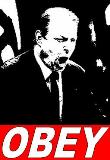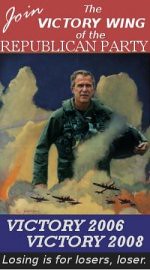
Baghdad, Iraq - Soldiers, patients and prisoners began voting Monday in national elections, three days ahead of the general population, while insurgents denounced the balloting as a "satanic project" but did not threaten to attack polling stations.
The early voting went ahead despite the sound of detonations rumbling across the capital and despite at least 15 deaths in ongoing violence.
President Bush offered encouraging words from Washington to Iraqi voters but cautioned that the parliamentary elections "won't be perfect."
"Iraqis still have more difficult work ahead, and our coalition and a new Iraqi government will face many challenges," the president said in a speech in Philadelphia.
In a rare joint statement, al-Qaeda in Iraq and four other Islamic extremist groups denounced the election as a "satanic project" and said that "to engage in the so-called political process" violates "the legitimate policy approved by God." |
I think a successful vote here is going to be another big victory for Iraq as it grapples with Islamofascism. They're expecting a huge voting turnout dispite the threat of violence. 250,000 voted yesterday. And the US allowed detainees in prisons around the world to vote as well; 90% of them exercised that right from prison (yet people still question our dedication to human rights. What other nation allows POWs to vote in their nation's election?). And I think Muslims are becoming less infatuated with Islamofascists. Al-Qaeda seems to be grasping at straws with their "voting violates God's laws" statements because that's not stopping Iraqis from voting. QandO thinks similarly with an excellent post about a decrease in the popularity of terrorist groups and an increased realization by Muslim nations that it is their best interest to combat the ideas of islamofascists in their own backyards.
Leaders of more than 50 Islamic countries at a summit in Mecca called by Saudi Arabia's ruler, King Abdullah, adopted an ambitious plan to combat extremism and poverty throughout the Muslim world yesterday.
The summit was prompted by an admission that Muslim societies had fallen into a deep malaise. "The Islamic nation is in a crisis," the leaders said in a final statement. "We need decisive action to fight deviant ideas because they are the justification of terrorism. There is a need to confront deviant ideology wherever it appears, including in school curriculums. Islam is the religion of diversity and tolerance."
The plan seeks to address what many see as the root causes of terrorism by "aggressively" confronting extremist rhetoric, including fatwas by unqualified clerics, promoting dialogue with other religions and fostering economic development in the poorer Muslim countries. It's notable that Saudi ruler King Abdullah is leading the movement, and even making unusually blunt statements such as the admission that an "endemic problem currently exists in the Islamic world", and that Islamic leaders need to "stop 'sitting as helpless observers' but to join the fight against international terrorism."
It's also notable that he plans to use windfalls from high oil profits to fund this, that he plans to focus on the Israeli-Palestinian conflict with the goal of ultimate recognition of both a Palestinian and Israeli state, and that King Abdullah is regarded as a very credible figure in the Mid-East. |
It's a great post. He doesn't think as much of the flypaper strategy as part of the GWOT as I do but hey, we can't all agree 100% of the time. While "flypaper" not the ultimate goal of the war in Iraq, it is a ancillary benefit to continuing to take the fight to the insurgents. Despite securing the Syrian border, terrorists will continue to try to enter Iraq to join the fight against the Great Satan. That's just more terrorists for us to remove from action whether KIA or captured for intelligence.
But the Iraqis should be an inspiration for us, truly risking their lives to make their voice heard, to chose the future of their nation.
 
  |
















